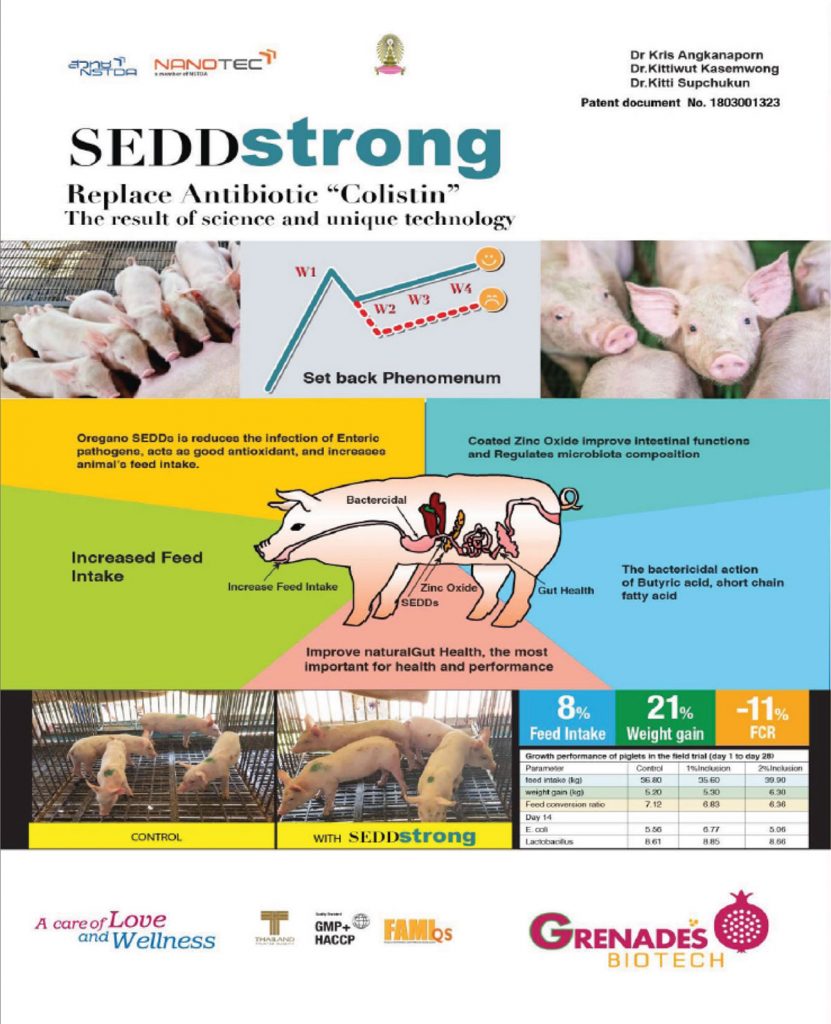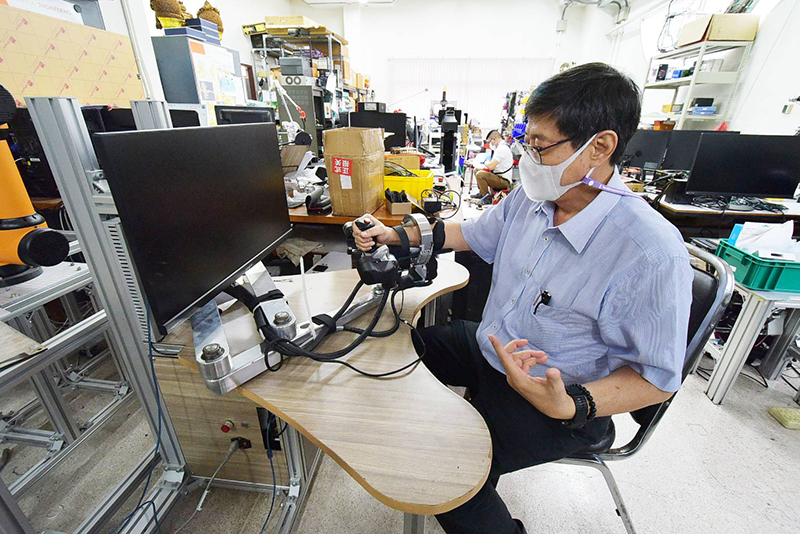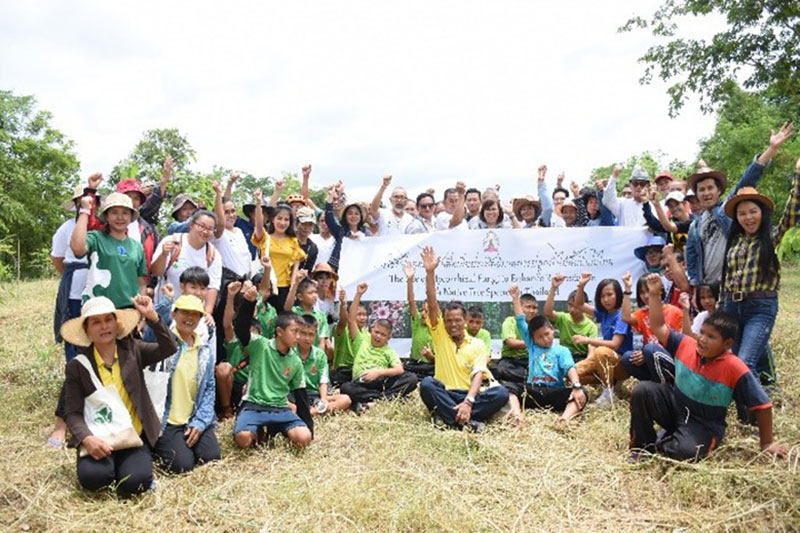Chula veterinary professor leads research into natural alternatives to antibiotics
Pigs are the most widely eaten animal in the world, accounting for about 38% of meat production worldwide. However, the use of antibiotics in pig farming has been a growing concern among consumers worldwide, as residual antibiotics in the meat they consume may have adverse effects on humans.
Consequently, pig farmers and the industry as a whole are facing increasing pressure to find practical solutions in response to consumer concerns.
While the poultry for export industry has already achieved antibiotic-free production to serve market needs, the local swine industry continues to rely on antibiotics to increase productivity and control diseases.
But bio-innovation research is helping pig farmers respond to consumers calling for food safety and reduced antibiotic use. Among those at the forefront of the search for answers is Associate Professor Dr Kris Anakanaporn of the Faculty of Veterinary Science Chulalongkorn University.
A livestock expert who has done extensive research on pork and poultry, Assoc Prof Dr Kris explains that raising a pig for pork production takes about five months, from a weaning piglet to its full-size weight of around 100 kilograms. During this long period, farmers use antibiotics not only to keep their pigs healthy and disease-free but also to increase their growth rate and weight gain.

Respiratory diseases in pigs are common in Thailand because of its wet tropical climate, but porcine epidemic diarrhea and suckling piglet diarrhea also rank high among potentially catastrophic conditions affecting swine production. Antibiotics to prevent and control diarrhea in pigs are big business, accounting for a 50-60% share of the antibiotic market in Thailand.
Antibiotics such as Colistin are widely used to treat bacterial infections that can lead to piglet diarrhea. The trade value of Colistin in Thailand reflects increased use by farmers, amounting to 60 million baht year.
“Today, in addition to Colistin, famers also use zinc oxide — as much as 3,000 milligrams per kilogram of feed — to treat E. coli bacteria in the intestine,” explains Assoc Prof Dr Kris. “Pig feces carries heavy metals such as zinc and other pathogens that are released as farm waste into the environment, causing adverse effects on the soil and groundwater system.”
To reduce the use of antibiotics in pig farming, he teamed up with another veterinarian, Dr Kitti Supchukun, and they formed a team to find alternatives to Colistin and other chemicals. The research, funded by the Talent Mobility Project of the Office of the Higher Education Commission, has successfully developed a bio-innovative product called SEDDStrong. It works by adapting Self Emulsifying Drug Delivery System (SEDD) technology to encapsulate oregano essential oil, combining it with other natural ingredients for efficacy of absorption in the pig intestine and convenience of use and transport.
A holistic approach has been applied
in developing SEDDStrong, says Assoc Prof Dr Kris. The product contains four
core ingredients: oregano SEDD to reduce the infection of central pathogens,
acting as an antioxidant and increasing the animal’s
feed intake; zinc oxide nanoparticles to protect the intestine; butyric acid
nanoparticles to reduce the smell of organic acid; and natural products for gut
health performance. A milk odor is added to make the formulation more familiar
and palatable to piglets.
The product was piloted and tested at a farm in Nakhon Pathom province, with close consultation and monitoring by the research team. “The pigs ate all the feed while diarrhea was greatly reduced,” was the feedback from the farmer. The researchers said it was “most gratifying” that their work had been helpful.
The SEDDStrong project has been recognized at national and international innovation contests. It won the Intarg award in Poland in 2018, the silver medal at the 2018 International Invention Innovation Competition in Canada, an innovation award from Politehnica University of Bucharest, and the Product of Thailand Tech Show 2019 Award from the National Science and Technology Development Agency. It was registered for a patent in 2019.
Assoc Prof Dr Kris expects to see more innovative products such as SEDDStrong distributed extensively in the market. Three-way collaboration involving the university, the private sector and industry can significantly contribute to the improvement of pork production quality and pig farming efficiency without using chemicals, in his opinion.

“This is just the beginning,” he says. “The next step of our research is to focus on adult pigs, and on how to make Thai pork palatable without using chemical leanness enhancing agents.”
The veterinary academic also takes an interest in farm management, given that small and medium farms account for 40% of the country’s pig output. He stresses the importance of farm assessment by a veterinarian to ensure full compliance with health and safety standards, disease control, antibiotic use, quality of water, feed contamination prevention and other factors.
“The assessment should also include the slaughtering process to ensure it is stress-free,” says Assoc Prof Dr Kris, pointing out that certain chemicals affecting pork quality will be released when a pig becomes stressed.
“To address the pork quality issue, the government must have a clear policy in response to the needs of the market and standards required by consumers,” he continues. “Production and marketing must go hand in hand.
“As for my role, I’ll proceed with creating natural products to replace chemical use, which will be beneficial for consumers as they will be able to eat good quality pork produced under better standards.”
This article was originally published in CU Around November 2018, Vol.61, Issue 11, Page 6-7, available at https://www.chula.ac.th/magazine/14218/
Others
Getting Even with Inequality in Asia
“Getting even – Public policies addressing inequality in Asia”. This book is a collection of research papers drawing lessons from economic and social policies that help reducing inequality in selected Asian countries.
Fungus Brings Forests Back to Life
CU-initiated project helping villagers see the economic value in reforestation





